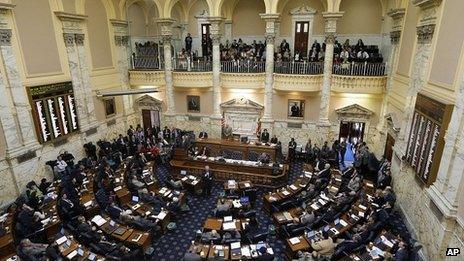US state of Maryland votes to abolish death penalty
- Published

The measure was debated in the House of Delegates in Annapolis
The US state of Maryland is poised to abolish the death penalty after its lawmakers voted 82 to 56 in favour of the move.
The measure now needs to be signed by Governor Martin O'Malley to become law.
Correspondents say it will be a formality as the Democratic governor has campaigned for five years to have the death penalty repealed.
Once signed into law, Maryland will become the 18th US state to abolish executions.
"Evidence shows that the death penalty is not a deterrent, it cannot be administered without racial bias and it costs three times as much as life in prison without parole," Governor O'Malley said in a statement.
"What's more, there is no way to reverse a mistake if an innocent person is put to death."
Opponents of the bill insisted capital punishment was a necessary tool to punish those who commit the most serious crimes.
Maryland has had the death penalty since 1638 when the territory was a British colony.
However, the state has neither sentenced anyone to death nor executed a prisoner since 2005.
The vote took place in the Maryland House of Delegates in the state capital, Annapolis. Eighty Democrats and two Republicans voted for the bill, which needed 71 votes to pass. Eighteen Democrats joined 38 Republicans to vote against it.
Connecticut became the 17th state to repeal the death penalty last year, meaning more than a third of the 50 states have now renounced executions.
- Published25 April 2012
- Published20 April 2012
- Published24 April 2012
- Published27 January 2012
- Published24 October 2011